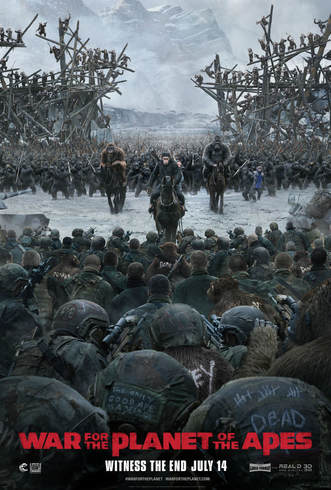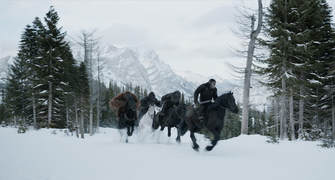Written by Mike CervantesTHIS IS THE EMERGENCY SPOILER ALERT SYSTEM...YOU ARE ADVISED TO READ AT YOUR OWN RISK... If I could ask one question of the film-analytical hivemind, it would be this: why are major American film franchises based on apes the most beloved? I already went through part of this diatribe at the beginning of my review for Kong: Skull Island. But on the other side of that damn dirty coin, we have Planet of the Apes, the film franchise that has been knocking around Hollywood since 1968, and while it is in no way as iconic as King Kong, what is truly amazing about it is that it has truly remained one single thread of a film franchise. Think about it: there are currently eight films in the Planet of the Apes series, four of which are direct sequels to the original, and two TV series, one of which is animated. All of which have been produced by 20th Century Fox, which is in itself an achievement. With the only exception being, possibly, the forgettable and quite frankly bonkers remake by Tim Burton in 2001, all of these movies and TV shows are in the exact same continuity; there’s no mucking with reboots and/or alternate expanded universes in Planet of the Apes, except perhaps in novels. Although it is possible for many people to see the current trilogy of films, originally directed by Rupert Wyatt in 2011, to be a remake, they are merely a trilogy of prequels that tell a chunk of the original story that could not have been done in terms of special effects in the 1960s. And to the credit of this most recent film, War of the Planet of the Apes, the story so far has been told admirably. In this series our perspective of humanity is fixated permanently on the band of hyper-intelligent apes, led by the genetically enhanced chimpanzee Caesar, played admirably through CG and motion capture by Andy Serkis. After a coup among his own people by a treacherous bonobo named Koba (Toby Kebbel), the apes have gone into total war against their human creators, forcing them into hiding. A plot is hatched by Caesar’s son Blue Eyes (Max Lloyd-Jones) to lead the apes across a vast desert to where they’d have their own sanctuary and civilization, but hope for that is shattered when a platoon of human soldiers led by Woody Harrelson’s enigmatic and dogmatic Colonel, raids the ape camp at night and kills Blue Eyes and his wife, Cornelia. The surviving apes are set to walk the desert as planned, but Caesar wants vengeance for the death of his family at the hands of the Colonel, so he strikes off on his own to do the deed, though he is followed by his closest friends in the overall series: Maurice the orangutan (Karin Konoval) and Rocket the chimpanzee (Terry Notary). This then becomes a road film where the trio of apes set to find the last human camp, eventually bringing along Steve Zahn, a chimp who refers to himself as ‘Bad Ape,’ and a human girl, orphaned at Caesar’s hand, that they call Nova (Amiah Miller).  It is through these members of the cast that it is revealed the further evolution of this series into the Apes continuity: it so happens that Bad Ape was granted intelligence from a strain of the simian flu introduced in the previous film, making him an evolved ape that was not a member of Caesar’s original colony. Nova, on the other hand, is a human that the simian flu has rendered mute and slightly primitive, making her one of the first in the long line of de-evolved humans we saw in the original series of films. The Colonel feels he is next in line for this de-evolution, which has stepped up his zealotry to wipe out all of ape-kind. Along with his first sergeant Precher (Gabriel Chavarria), he leads a rogue colony of humans that have captured apes, forcing them to build an enormous wall to blockade the remaining human army while he continues the war despite most humans expressing its futility. Aside from these plot points you can expect yet another prison-escape scene where Caesar once again has to use his intellect to rescue the imprisoned apes from the Colonel’s camp, and all the brawling, explosions, and literal war that come with it. This isn’t to say that War does a bad job with the material it has, only that the overall action feels vastly more straightforward and abridged compared to the previous two films. Given that this is the conclusion to a trilogy, there isn’t much more that could have been introduced; the work has to be invested upon making sure everything is wrapped up for this particular package of Apes films. In the film’s full run, everything is indeed wrapped up in regards to every character, and is built to set the stage for the continuity as we know it in the original series of films. War for the Planet of the Apes is a satisfying conclusion to its two predecessors, and a welcome addition to this long-running film series as a whole. It may not stand on its own as strongly as its two previous films, but it doesn’t intend to. For the second time in six decades, we are bringing down the curtain on the series, and its future as a cornerstone of sci-fi Americana is still going strong as a result.
0 Comments
Leave a Reply. |
Archives
March 2025
|
|
© 2012-2025, Nerds That Geek LLC.
All Rights Reserved. |
uWeb Hosting by FatCow


 RSS Feed
RSS Feed